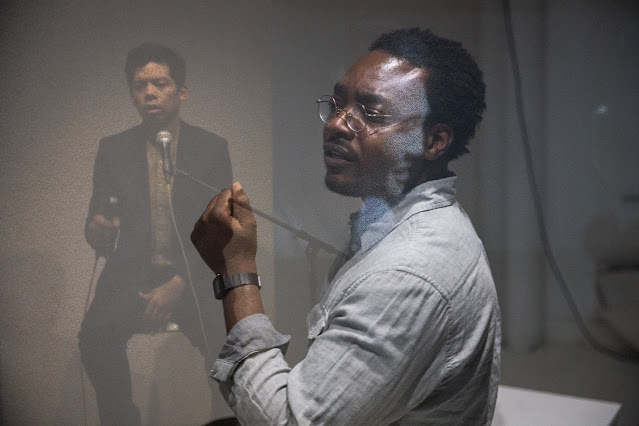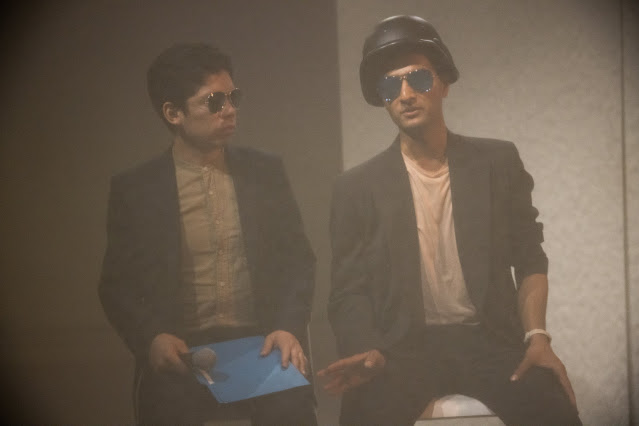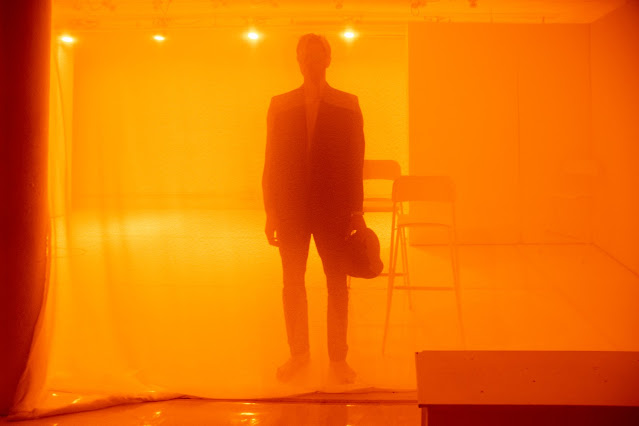Sky of Darkness
Written by Siting Yang
Directed by Rakesh Palisetty
Produced by Zhe Pan and Devin Ray Ramirez at Theaterlab
357 W 36th St, 3rd floor, Manhattan, NYC
June 2-12, 2022
 |
| L TO R: HanJie Chow and Malcolm Opoku in Sky of Darkness. Photo by Maria Baranova |
Playwright Siting Yang's
Sky of Darkness, currently in its world premiere run at Theaterlab, begins with talk of rivers: the Charles River, the Niger River, even the sky as a kind of river. These invocations are fitting not only because Yang's play loosely adapts Joseph Conrad's 1899 river-journey novella
Heart of Darkness but also because their simultaneous embodiment of stasis and change, fixed place and ceaseless movement, nicely mirrors the dynamics of neo-imperialism (as well as, perhaps, of personal histories) that
Sky of Darkness explores. As part of this exploration, the program notes, "the work is based on actual, first-person accounts of Chinese nationals who found themselves in the service of a huge government-owned industrial conglomerate selling and operating military equipment in West Africa," part of new forms of globalized capitalist exploitation that might nevertheless seem quite familiar to someone from Conrad's time.
Sky of Darkness knits these past and present elements together into a cerebral and visually inventive experience.
 |
| HanJie Chow as Ma Luo in Sky of Darkness. Photo by Maria Baranova |
The character talking about those rivers is the ghost of Nigerian writer Chinua Achebe (a charismatic Malcolm Opoku), most well-known in the United States for his novel
Things Fall Apart (1958). In 1975, Achebe delivered the influential lecture "An Image of Africa: Racism in Conrad's
Heart of Darkness," later published as an essay; and here, his spirit–another instance of the past returning in the present–functions as our metatheatrical narrator, framing and commenting on the play's contemporary story of Chinese pilot Ma Luo (HanJie Chow). Ma Luo works for the China National Aero-Technology Import & Export Corporation and is given a promotion by the company's HR manager (Keizo Kaji), told that he is needed as a test pilot, an exciting but dangerous position. After taking leave of his fiancée (Bingcong Zhu), who has her own career plans, Ma arrives in Mali to find that his actual job is to retrieve a sick diplomat named Ku Erci, who oversees Chinese state-owned enterprises in Mali and who, we later learn, has been writing a (resonantly named) white paper defending Chinese dealings in Africa. With some Communist Party members (Patrick Zhao, Keizo Kaji, Alex Lyndon, Yibin Wang) onboard–who deny that neo-imperialism is a new from of colonialism and chummily share their unvarnished thoughts about African people–Ma sets off towards what will prove to be multiple reckonings.
 |
| L to R: HanJie Chow and Sanskar Agarwal in Sky of Darkness. Photo by Maria Baranova |
Close-minded travelers can be "astonishingly blind," Achebe's ghost informs us early on, and the striking staging and set design seems to pick up on tha metaphor of occluded sight (and/as memory as well): a translucent scrim stretches across the front of the performance area, with Achebe's ghost in front and the rest of the action unfolding behind, bathed in a gauzy whiteness. This arrangement creates something like a physical embodiment of the play's narrative layers, and it increases the impact when Achebe finally breaches that boundary. It also provides an effective canvas for Danielle Elegy's excellent lighting design, while the set's white on white on white aesthetic offers a link to the way in which Conrad's novella plays with common associations attached to white/light and darkness. The Pakistani mercenary pilot (Sanskar Agarwal, making a strong impression in a relatively brief span) whom Ma encounters appears almost as if floating as he waits perched in a high white chair to enter the narrative; and this pilot is one of only three characters, the others being Ma Luo and Achebe's ghost, to be played by live actors. The rest of the characters appear in projected filmed segments (one might, as per some film theorists, view them as further ghosts). Ma's conversations and physical interactions with some of these projections create a memorable kind of distancing effect; and the floor-to-ceiling projection on the (white) back wall can hint at the experience of museum exhibits, which themselves have been tools of colonial mastery, as alluded to in an anecdote from one of the Party members.
 |
| Sanskar Agarwal in Sky of Darkness. Photo by Maria Baranova |
At one point,
Sky of Darkness juxtaposes timelines of Ma Luo and Ku Erci's lives (Ku too has left behind an intended [Leyi Zhou]), highlighting the need for Ma to cultivate his awareness and examine the current and potential directions of his life. As the play says, and this is as true for its audience as for its characters, knowing is not the same as seeing. It also emphasizes the importance of perspective: as Achebe's ghost makes clear, looking down on a dark place from the air does not account for the unimpeded starlight that once would see from the ground. With intelligence and creative flair,
Sky of Darkness works to change our own perspectives by placing before us an important story that we might otherwise fail or even refuse to see.
-John R. Ziegler and Leah Richards







Comments
Post a Comment